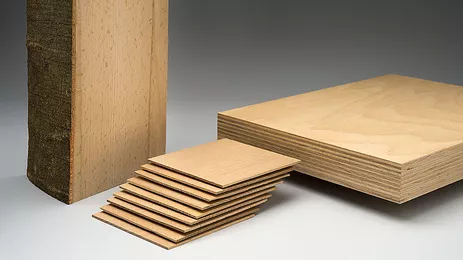Research Area Material Science and Engineering
Research Area Material Science
The Wood Materials Science and Engineering team works on the development of new wood-based materials by tuning the physicochemical properties of new tailored products. The focus of our research activities is on the development of wood adhesives, wood-based polymers, wood coatings, wood composites and wood nanotechnology.
Projects
- “Wood Based Materials in Mechanical Engineering (HoMaBa) - calculation concepts, requirements for parameters, determination of parameters” (Max Engelhardt)
- “Research on Physical, Structural and Chemical Properties of Wood and Their Relation to Glueability” (Max Engelhardt)
- “Investigation of Interactions Between Adhesives, Chemical Surface Treatments and Wood” (Thomas Böger)
- “Enhancing the Reliability of Bondings and Improvement of Emission Behaviour of Glued Laminated Timber (Glulam) from European Beech” (Mathias Schuh)
- “Adhesives for Glulam Production and Coatings” (A. Sanchez-Ferrer)
- “Lignocellulosic Polymer-based Thermoplastics and Thermosets” (A. Sanchez-Ferrer)
- “Wood-based Actuators and Sensors” (A. Sanchez-Ferrer)
Equipment
- Tensile and compression in acclimatized laboratories (Zwick & TesT)
- Digital Image Correlation (GOM)
- Sorption Moisture Isotherms (DVS Advantage ET, Surface Measurement Systems)
- Rheology (Physica MCR 301, Anton Paar)
- Contact Angle (EasyDrop, Krüss)
- Pendulum test
- Gel time (Gel timer, Helmut Saur)
Services
- Chemical Impregnation
- Wood drying
- Extreme-Climate rooms
- Climate chamber (WK3, Weiss)
- Climate rooms (20 °C and 65%RH)
- Lab-scale production line for wood-based composites
- Chipping
- Sorting
- Adhesive application
- Delamination test
- Pressing
- Density profile
- Particle distribution
- Raised floor tests
- Standardized measurements for adhesive properties (EN 302-1…8 & EN 205)
We are currently looking for curious and highly motivated students to conduct experimental research on topics related to Wood Materials Science and Engineering, and we are offering several topics for conducting your thesis under the guidance of experts in the field.
Contact us: werkstoffe(at)hfm.tum.de
Research Area Fire
A consistent focus of our research is gathering parameters for the determination of the charring rate of wood and wood materials during a fire, as well as the advancement and standardization of the charring rate determination method.
For the determination of the smoldering behavior of building products, a special testing device was developed and tested by our work group. This project was accompanied by a number of student theses. Meanwhile, the developed device has been standardized as EN 16733.
Auto ignition of timber is a phenomenon scarcely examined worldwide. Our research shows that auto ignition is strongly influenced by the surrounding conditions such as oxygen availability, heat insulation and radiation.
Through the knowledge of fire tests, the behavior of materials toward fire can be enhanced or optimized. Besides, the findings help to develop wood materials and the corresponding impregnations or coatings.
For more information on the activities of the fire testing laboratory (PÜZ) of HFM.
Contact: Rupert Ehrlenspiel
